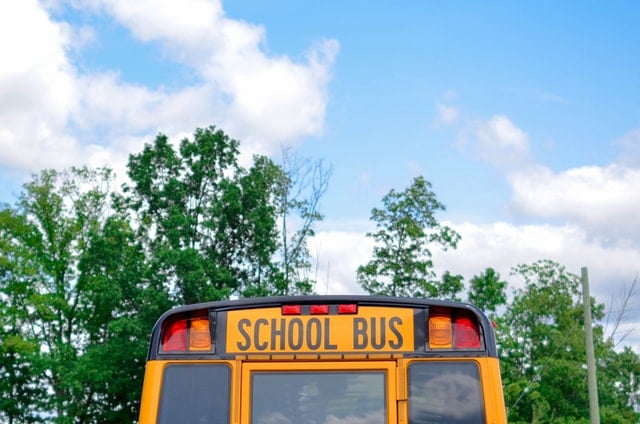Amid the COVID-19 pandemic, children had to adapt to a new way of learning. Teachers, parents, and students alike adhered to distance education and hybrid schedules to maintain the safety of themselves and those around them. With that said, the 2021-2022 school year has welcomed back a return to the classroom. Hasty parents and yellow buses are back in action, causing more congestion and a higher risk for pedestrian hazards.
According to Alex Epstein, former director of Transportation Safety for the National Safety Council, “This can be a dangerous time because children—as well as drivers—are adjusting to back-to-school routines.” After a year of remote learning, drivers must call to mind safe driving practices and stay extra alert within school zones, around school buses, and crosswalks where kids often display unpredictable behavior. In fact, 8 out of 10 students display at least one unsafe behavior while crossing the street.
For these reasons, it’s time to revisit safe driving practices during the school year.
What are school zone driving directives?
School zones are designated areas where children are present. To implement school zones, legislators enforce signs and street markings to improve the safety of that area. While driving in a school zone, drivers must also keep a perceptive eye on the following:
- Crossing guards
- Reduced speed zones
- Children walking/running
- Stronger police presence
All school zones are created to keep drivers and pedestrians safe from harm or injury. By the same token, civilians are expected to obey all applicable laws in regard to child safety. Florida legislators are making certain that all school zone violations are taken seriously. Here are the best ways to uphold school zone safety:
Obey speed limits
School zone speed limits range from 15 to 20 miles per hour according to Florida Statutes. These speeds are enforced on school days, both thirty minutes before and after school commences. In most Florida towns, yellow flashing lights indicate you are entering a school zone and speed limits must be followed. Once you see the End of School Zone sign, you’ll know it’s time to return back to normal speeds.
Yield for pedestrians
In designated school zones, you’ll witness students entering and exiting buses, children riding bikes, and high schoolers rushing to class. At certain times of the day this can mean chaos for drivers. Keep a watchful eye for children crossing the street, even when a crosswalk is not present. Data from the Governors Highway Safety Association suggests pedestrian fatalities have increased by 46% in the last decade. Therefore, it’s a driver’s responsibility to yield at all times.
To learn more about school zone safety, read Chapter 316 Section 1895 of the 2020 Florida Statutes.
What are school zone violations?
Citations are given to drivers who display reckless behavior. Most school zones enforce a police presence to further heighten the call for safe driving in areas where schools and children are present. The following list details Florida school zone violations that will result in a traffic ticket:
- Speeding
- Texting while driving
- Failure to yield for a pedestrian
- Dismiss a crossing guard
These driving offenses are met with serious penalties. If the citation accompanies another criminal offense, such as a DUI, the driver will be arrested on the scene.
What are the penalties for speeding in a school zone?
When the safety of children is at risk, you can expect weighty repercussions. Speeding in a school zone is not only dangerous, it increases the likelihood of pedestrian injury or fatality. To emphasize the gravity of school zone citations, here is a breakdown of the fines you’ll pay.
- $50 for 1-9 MPH over the speed limit
- $200 for 10-14 MPH over the speed limit
- $300 for 15-19 MPH over the speed limit
- $350 for 20-29 MPH over the speed limit
- $500 for 30-39 MPH over the speed limit
- $2,000 for 50 MPH (or more) over the speed limit
In addition to the fine, Florida law implements a point system to keep track of traffic violations. The violation points are assigned based on the level of infraction, and thereby remain on your record for the following five years. Not to mention, the points system will adversely affect your insurance premium due to an impaired driving record. The more points you earn, the greater chance your license will be suspended.
Defending school zone violations
School zone violations are only permitted during regulated hours of the day. Therefore, on weekends, holidays, or after school hours, a driver cannot be fined for a school zone violation. Notably, it is important for drivers to familiarize themselves with local school zone ordinances to avoid any discrepancies. If you are issued a citation outside of the specified parameters, contact Porcaro Law immediately. We will work vigilantly to defend your case.
Our team of experienced attorneys will assess the officer’s course of action. First, we’ll take note if the violation was fairly issued in a school zone and if improper signage was at fault. Second, we’ll observe every detail — we’ll investigate your speed, the school zone boundary, and the accuracy of the speed measurement device. We’ll take every step necessary to see that your unlawful violation will not stand in court.
Call Porcaro Law if you receive a school zone violation
Knowing you have the right attorney on your side could change everything. We know you might have some questions regarding school zone safety and your rights, which is why Porcaro Law offers an open door policy. We help clients in Delray Beach, Boca Raton, West Palm Beach, Miami, Fort Lauderdale, and more.
Contact us today and we’ll begin defending your case.
